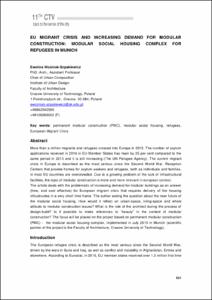Mostra el registre d'ítem simple
EU migrant crisis and increasing demand for modular construction: modular social housing complex for refugees in Munich
| dc.contributor.author | Woźniak-Szpakiewicz, Ewelina |
| dc.date.accessioned | 2016-10-07T14:04:00Z |
| dc.date.available | 2016-10-07T14:04:00Z |
| dc.date.issued | 2016-07 |
| dc.identifier.citation | Woźniak-Szpakiewicz, Ewelina. EU migrant crisis and increasing demand for modular construction: modular social housing complex for refugees in Munich. A: Virtual City and Territory. "Back to the Sense of the City: International Monograph Book". Barcelona: Centre de Política de Sòl i Valoracions, 2016, p. 921-931. |
| dc.identifier.isbn | 978-84-8157-660-3 |
| dc.identifier.uri | http://hdl.handle.net/2117/90599 |
| dc.description.abstract | More than a million migrants and refugees crossed into Europe in 2015. The number of asylum applications received in 2014 in EU Member States has risen by 25 per cent compared to the same period in 2013 and it is still increasing (The UN Refugee Agency). The current migrant crisis in Europe is described as the most serious since the Second World War. Reception Centers that provide homes for asylum-seekers and refugees, both as individuals and families, in most EU countries are overcrowded. Due to a growing problem of the luck of infrastructural facilities, the topic of modular construction is more and more relevant in european context. The article deals with the problematic of increasing demand for modular buildings as an answer (time, and cost effective) for European migrant crisis that requires delivery of the housing infrustructes in a very short time frame. The author asking the question about the near future of the modular social housing. How would it reflect on urban-space, living-space and whole attitude to modular construction issues? What is the role of the architect during the process of design-build? Is it possible to make references to “beauty” in the context of modular construction? The focus will be placed on the project based on permanent modular construction (PMC) - the modular social housing complex, implemented in July 2015 in Munich (scientific partner of the project is the Faculty of Architecture, Cracow University of Technology). |
| dc.format.extent | 11 p. |
| dc.language.iso | eng |
| dc.publisher | Centre de Política de Sòl i Valoracions |
| dc.relation.ispartof | International Conference Virtual City and Territory (11è: 2016: Cracòvia) |
| dc.rights | Attribution-NonCommercial-NoDerivs 3.0 Spain |
| dc.rights.uri | http://creativecommons.org/licenses/by-nc-nd/3.0/es/ |
| dc.subject | Àrees temàtiques de la UPC::Arquitectura::Tipologies d'edificis::Habitatges |
| dc.subject.lcsh | Public housing -- Germany -- Munich |
| dc.subject.lcsh | Modular construction |
| dc.subject.lcsh | Immigrants |
| dc.subject.other | Permanent modular construction (PMC) |
| dc.subject.other | Modular social housing |
| dc.subject.other | Refugees |
| dc.subject.other | European Migrant Crisis |
| dc.title | EU migrant crisis and increasing demand for modular construction: modular social housing complex for refugees in Munich |
| dc.type | Conference report |
| dc.subject.lemac | Habitatge públic -- Alemanya -- Munic |
| dc.subject.lemac | Construcció modular |
| dc.subject.lemac | Immigrants |
| dc.identifier.doi | 10.5821/ctv.8094 |
| dc.rights.access | Open Access |
| local.citation.contributor | Virtual City and Territory |
| local.citation.pubplace | Barcelona |
| local.citation.publicationName | Back to the Sense of the City: International Monograph Book |
| local.citation.startingPage | 921 |
| local.citation.endingPage | 931 |
Fitxers d'aquest items
Aquest ítem apareix a les col·leccions següents
-
11th Congress Virtual City and Territory, Krakow, 6-8 July 2016 [121]
Back to the sense of the city


